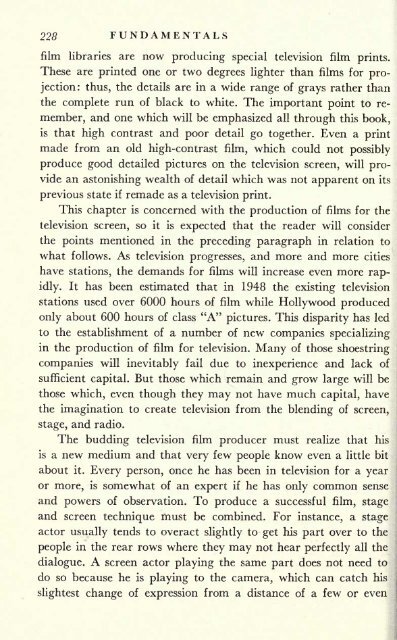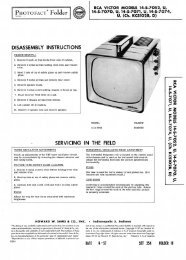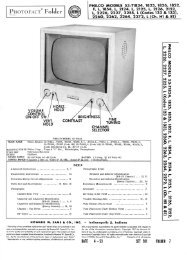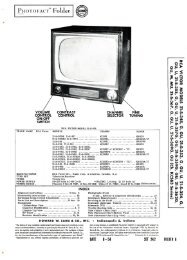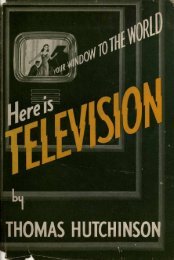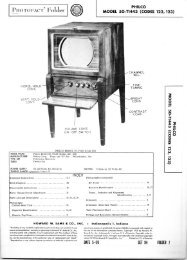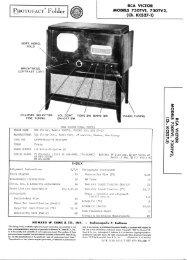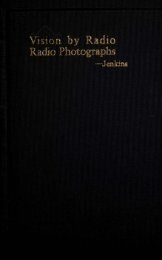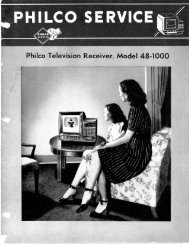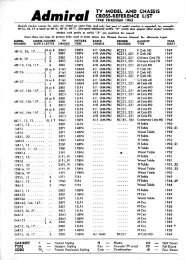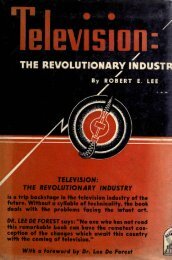- Page 1 and 2:
John ison
- Page 3:
CARL GENTRY OEHLER PROFESSIONAL PHO
- Page 6 and 7:
THE MACMILLAN COMPANY NEW YORK . CH
- Page 8 and 9:
Copyright, 1950, by The Macmillan C
- Page 11 and 12:
INTRODUCTION Television and the man
- Page 13 and 14:
INTRODUCTION ix since many subjects
- Page 15 and 16:
CHAPTER 1 CHAPTER 2 CONTENTS PART O
- Page 17 and 18:
CHAPTER 11 CHAPTER 12 CHAPTER 13 CH
- Page 19:
CHAPTER 20 CHAPTER 21 CHAPTER 22 SC
- Page 23 and 24:
CHAPTER 1 PRINCIPLES OF MOVIES WHAT
- Page 25 and 26:
PRINCIPLES OF MOVIES 5 perforations
- Page 27 and 28:
PRINCIPLES OF MOVIES 7 time ago, be
- Page 29 and 30:
PRINCIPLES OF MOVIES p are the crys
- Page 31 and 32:
change occurs. The grain PRINCIPLES
- Page 33 and 34:
PRINCIPLES OF MOVIES 13 changing fi
- Page 35 and 36:
PRINCIPLES OF MOVIES 75 Fig. 1-3. H
- Page 37 and 38:
PRINCIPLES OF MOVIES 77 expressed a
- Page 39 and 40:
PRINCIPLES OF MOVIES 19 It is used
- Page 41 and 42:
PRINCIPLES OF MOVIES 21 dub-in The
- Page 43 and 44:
PRINCIPLES OF MOVIES 23 floor manag
- Page 45 and 46:
PRINCIPLES OF MOVIES 25 to reduce t
- Page 47 and 48:
PRINCIPLES OF MOVIES 27 modelling l
- Page 49 and 50:
PRINCIPLES OF MOVIES 29 left to rig
- Page 51 and 52:
PRINCIPLES OF MOVIES 31 ture over a
- Page 53 and 54:
CHAPTER PRINCIPLES OF TV Before pro
- Page 55 and 56:
PRINCIPLES OF TV 35 photocell intel
- Page 57 and 58:
PRINCIPLES OF TV 37 48 flashes per
- Page 59 and 60:
PRINCIPLES OF TV 39 most important,
- Page 61 and 62:
PRINCIPLES OF TV 41 method is bette
- Page 63 and 64:
PRINCIPLES OF TV 43 good. Unfortuna
- Page 65 and 66:
PRINCIPLES OF TV 45 Figure 2-1. Typ
- Page 67 and 68:
1 a I an CHAPTER MOVIE-MAKING EQUIP
- Page 69 and 70:
! MOVIE-MAKING EQUIPMENT 49 hundred
- Page 71 and 72:
j cased MOVIE-MAKING EQUIPMENT 51 F
- Page 73 and 74:
MOVIE-MAKING EQUIPMENT 53 Fig. 3-3.
- Page 75 and 76:
MOVIE-MAKING EQUIPMENT 55 the batte
- Page 77 and 78:
MOVIE-MAKING EQUIPMENT 57 (Courtesy
- Page 79 and 80:
MOVIE-MAKING EQUIPMENT 59 Fig. 3-8.
- Page 81 and 82:
MOVIE-MAKING EQUIPMENT 61 Fig. 3-9.
- Page 83 and 84:
MOVIE-MAKING EQUIPMENT 63 up to 999
- Page 85 and 86:
MOVIE-MAKING EQUIPMENT 65 Fig. 3-12
- Page 87 and 88:
MOVIE-MAKING EQUIPMENT 67 point on
- Page 89 and 90:
MOVIE. MAKING EQUIPMENT 69 Sound Re
- Page 91 and 92:
MOVIE-MAKING EQUIPMENT 71 sound mod
- Page 93 and 94:
MOVIE-MAKING EQUIPMENT 73 Single Sy
- Page 95 and 96:
larger crew required, MOVIE-MAKING
- Page 97 and 98:
MOVIE-MAKING EQUIPMENT 77 Fig. 3-15
- Page 99 and 100:
MOVIE-MAKING EQUIPMENT 79 Fig. 3-17
- Page 101 and 102:
MOVIE- MAKING EQUIPMENT 81 Sound, o
- Page 103 and 104:
MOVIE-MAKING EQUIPMENT 83 electrici
- Page 105 and 106:
MOVIE-MAKING EQUIPMENT Reversal Plu
- Page 107 and 108:
MOVIE-MAKING EQUIPMENT 87 Care of F
- Page 109 and 110:
MOVIE-MAKING EQUIPMENT 89 This defe
- Page 111 and 112:
MOVIE-MAKING EQUIPMENT 91 Fig. 3-18
- Page 113 and 114:
MOVIE-MAKING EQUIPMENT 93 posed, th
- Page 115 and 116:
FILM TRANSMISSION EQUIPMENT 95 "mai
- Page 117 and 118:
FILM TRANSMISSION EQUIPMENT 97 in s
- Page 119 and 120:
FILM TRANSMISSION EQUIPMENT 99 ther
- Page 121 and 122:
FILM TRANSMISSION EQUIPMENT Wl GE a
- Page 123 and 124:
FILM TRANSMISSION EQUIPMENT l/12Sec
- Page 125 and 126:
FILM TRANSMISSION EQUIPMENT 105 Fig
- Page 127 and 128:
I working FILM TRANSMISSION EQUIPME
- Page 129 and 130:
FILM TRANSMISSION EQUIPMENT 109 tro
- Page 131 and 132:
FILM TRANSMISSION EQUIPMENT 111
- Page 133 and 134:
FILM TRANSMISSION EQUIPMENT 113 a m
- Page 135 and 136:
FILM TRANSMISSION EQUIPMENT 115 the
- Page 137 and 138:
FILM TRANSMISSION EQUIPMENT 117 Fig
- Page 139 and 140:
FILM TRANSMISSION EQUIPMENT 119 wit
- Page 141 and 142:
FILM TRANSMISSION EQUIPMENT 121 dif
- Page 143 and 144:
KINESCOPE RECORDING 123 New York ti
- Page 145 and 146:
KINESCOPE RECORDING 725 characters
- Page 147 and 148:
KINESCOPE RECORDING 127 situation w
- Page 149 and 150:
KINESCOPE RECORDING 129 the mechani
- Page 151 and 152:
KINESCOPE RECORDING 131 movies, or
- Page 153 and 154:
CHAPTER LENSES 'n this chapter the
- Page 155 and 156:
LENSES 135 old one. There is not mu
- Page 157 and 158:
f LENSES 137 In addition the older
- Page 159 and 160:
ing. 1 LENSES 139 This has a number
- Page 161 and 162:
LENSES 141 struction book for the i
- Page 163 and 164:
LENSES 143 duces some spherical abe
- Page 165 and 166:
LENSES 145 Fig. 6-1. Zoomar long di
- Page 167 and 168:
CHAPTER 7 LIGHTING If the technical
- Page 169 and 170:
LIGHTING 149 temperature, and somet
- Page 171 and 172:
LIGHTING 757 or reflects a light of
- Page 173 and 174:
(From Alton, Painting \vith Light.
- Page 175 and 176:
LIGHTING 755 to make the exposure,
- Page 177 and 178:
LIGHTING 757 tion equally well with
- Page 179 and 180:
LIGHTING 159 job; the set was flood
- Page 181 and 182:
LIGHTING 161 Fig. 7-2. Lighting equ
- Page 183 and 184:
LIGHTING 163 In setting up stage li
- Page 185 and 186:
LIGHTING 165 employment of a meter
- Page 187 and 188:
COLOR 767 monochrome system show up
- Page 189 and 190:
COLOR 169 mitted. The system is seq
- Page 191 and 192:
megacycles, COLOR 777 with contribu
- Page 193 and 194:
COLOR 173 Thus a light with a low c
- Page 195 and 196:
COLOR 775 color film is seldom used
- Page 197 and 198: COLOR 777 toward red for day use is
- Page 199 and 200: CHAPTER EDITING AND CONTINUITY ossi
- Page 201 and 202: EDITING AND CONTINUITY 181 Some of
- Page 203 and 204: literary development; EDITING AND C
- Page 205 and 206: EDITING AND CONTINUITY 185 down in
- Page 207 and 208: EDITING AND CONTINUITY 187 simple d
- Page 209 and 210: EDITING AND CONTINUITY 189 For this
- Page 211 and 212: EDITING AND CONTINUITY 191 Fig. 9-3
- Page 213 and 214: EDITING AND CONTINUITY 193 Fig. 9-4
- Page 215 and 216: EDITING AND CONTINUITY 795 onto one
- Page 217 and 218: EDITING AND CONTINUITY 197 on top o
- Page 219 and 220: CHAPTER 10 TITLES AND SPECIAL EFFEC
- Page 221 and 222: TITLES AND SPECIAL EFFECTS 201 psyc
- Page 223 and 224: TITLES AND SPECIAL EFFECTS 203 sile
- Page 225 and 226: TITLES AND SPECIAL EFFECTS 205 Fig.
- Page 227 and 228: TITLES AND SPECIAL EFFECTS 207 long
- Page 229 and 230: TITLES AND SPECIAL EFFECTS 209 at t
- Page 231 and 232: TITLES AND SPECIAL EFFECTS 211 been
- Page 233 and 234: TITLES AND SPECIAL EFFECTS 213 glas
- Page 235 and 236: TITLES AND SPECIAL EFFECTS 215 ligh
- Page 237 and 238: TITLES AND SPECIAL EFFECTS 217 are
- Page 239 and 240: TITLES AND SPECIAL EFFECTS 219 the
- Page 241 and 242: TITLES AND SPECIAL EFFECTS 221 opti
- Page 243 and 244: TITLES AND SPECIAL EFFECTS 223 the
- Page 245 and 246: TITLES AND SPECIAL EFFECTS 225 read
- Page 247: CHAPTER 11 MAKING FILMS FOR TV Up t
- Page 251 and 252: MAKINGFILMSFORTV 257 holes in the h
- Page 253 and 254: MAKINGFILMSFORTV 233 appear in the
- Page 255 and 256: f MAKINGFILMSFORTV 235 color combin
- Page 257 and 258: MAKINGFILMSFORTV 237 a special 12-v
- Page 259 and 260: MAKINGFILMSFORTV 239 produce only a
- Page 261 and 262: MAKINGFILMSFORTV 241 Chalk marks ar
- Page 263: PART TWO THE PROGRAM ANGLE
- Page 266 and 267: 246 THE PROGRAM ANGLE delegated to
- Page 268 and 269: 248 THE PROGRAM ANGLE stages, scene
- Page 270 and 271: 250 THE PROGRAM ANGLE and said the
- Page 272 and 273: 252 THE PROGRAM ANGLE mean that thr
- Page 274 and 275: 254 THE PROGRAM ANGLE staff might f
- Page 276 and 277: 256 THE PROGRAM ANGLE If the film i
- Page 278 and 279: 258 THE PROGRAM ANGLE rent for from
- Page 280 and 281: 260 THE PROGRAM ANGLE does is to ma
- Page 282 and 283: 262 THE PROGRAM ANGLE Camera #1. Pa
- Page 284 and 285: 264 THE PROGRAM ANGLE Different sho
- Page 286 and 287: 266 THE PROGRAM ANGLE arches or Mos
- Page 288 and 289: 268 THE PROGRAM ANGLE For this reas
- Page 290 and 291: 270 THE PROGRAM ANGLE producer cann
- Page 292 and 293: 272 THE PROGRAM ANGLE tion. This ca
- Page 294 and 295: 274 THE PROGRAM ANGLE and the film
- Page 296 and 297: 276 THE PROGRAM ANGLE in the studio
- Page 298 and 299:
278 THE PROGRAM ANGLE of scene. Or
- Page 300 and 301:
280 THE PROGRAM ANGLE chocolate and
- Page 302 and 303:
282 THE PROGRAM ANGLE will be the r
- Page 304 and 305:
284 THE PROGRAM ANGLE film, or pays
- Page 306 and 307:
286 THE PROGRAM ANGLE vision newsre
- Page 308 and 309:
288 THE PROGRAM ANGLE unusual, it w
- Page 310 and 311:
290 THE PROGRAM ANGLE Fig. 15-1 The
- Page 312 and 313:
292 THE PROGRAM ANGLE in darkness,
- Page 314 and 315:
294 THE PROGRAM ANGLE Suppose we ar
- Page 316 and 317:
CHAPTER 16 PROCESSING NEWSREEL SCRI
- Page 318 and 319:
298 THE PROGRAM ANGLE CONVERSION TA
- Page 320 and 321:
300 THE PROGRAM ANGLE to someone wi
- Page 322 and 323:
302 THE PROGRAM ANGLE come into gen
- Page 324 and 325:
304 THE PROGRAM ANGLE is quite natu
- Page 326 and 327:
306 THE PROGRAM ANGLE write under w
- Page 328 and 329:
308 THE PROGRAM ANGLE they were mad
- Page 330 and 331:
310 THE PROGRAM ANGLE carefully man
- Page 332 and 333:
312 THE PROGRAM ANGLE picked up the
- Page 334 and 335:
314 THE PROGRAM ANGLE cial to sell
- Page 336 and 337:
316 THE PROGRAM ANGLE For a straigh
- Page 338 and 339:
318 THE PROGRAM ANGLE commercial wh
- Page 340 and 341:
320 THE PROGRAM ANGLE in which the
- Page 342 and 343:
322 THE PROGRAM ANGLE repetitious n
- Page 344 and 345:
324 THE PROGRAM ANGLE have not been
- Page 346 and 347:
326 THE PROGRAM ANGLE of the medium
- Page 348 and 349:
CHAPTER 19 USE OF KINESCOPE RECORDI
- Page 350 and 351:
330 THE PROGRAM ANGLE TELEVISIONNET
- Page 352 and 353:
332 THE PROGRAM ANGLE film. Now the
- Page 354 and 355:
334 THE PROGRAM ANGLE Paramount has
- Page 356 and 357:
336 THE PROGRAM ANGLE Closed-circui
- Page 358 and 359:
338 THE PROGRAM ANGLE within the ne
- Page 360 and 361:
340 THE PROGRAM ANGLE mind that the
- Page 362 and 363:
342 THE PROGRAM ANGLE covers the fi
- Page 364 and 365:
344 THE PROGRAM ANGLE add a little
- Page 366 and 367:
346 THE PROGRAM ANGLE sound effects
- Page 368 and 369:
348 THE PROGRAM ANGLE are used very
- Page 370 and 371:
350 .5
- Page 372 and 373:
552 THE PROGRAM ANGLE stores which
- Page 374 and 375:
CHAPTER 21 STUDIO OR LOCATION SHOOT
- Page 376 and 377:
356 THE PROGRAM ANGLE (this is some
- Page 378 and 379:
358 THE PROGRAM ANGLE sees around N
- Page 380 and 381:
360 THE PROGRAM ANGLE was a good ba
- Page 382 and 383:
362 THE PROGRAM ANGLE for ordinary
- Page 384 and 385:
364 THE PROGRAM ANGLE releases. It
- Page 386 and 387:
366 THE PROGRAM ANGLE have afforded
- Page 388 and 389:
368 THE PROGRAM ANGLE shots of the
- Page 391 and 392:
INDEX Academy leader, 109, 256 Accu
- Page 393 and 394:
Film, producer, 180 recording, 328
- Page 395 and 396:
Perspective, 143, 267 Petty cash, 3
- Page 399 and 400:
5. .9 = *.I * "O c>l O* O _S .E I -


